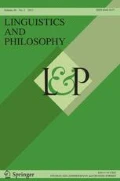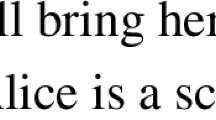Abstract
This paper addresses a little puzzle with a surprisingly long pedigree and a surprisingly large wake: the puzzle of Free Choice Permission. I begin by presenting a popular sketch of a pragmatic solution to the puzzle, due to Kratzer and Shimoyama (Proceedings of the third Tokyo conference on psycholinguistics, 2002), which has received a good deal of discussion, endorsement and elaboration in recent work (Aloni and van Rooij, Proccedings of the KNAW Academy Colloquium: Cognitive foundations of interpretation, 2004; Alonso-Ovalle, Ph.D. thesis, 2006; Chierchia, Linguist Inq 37(4):535–590, 2006; Fox, in: Sauerland and Stateva (eds.) Presupposition and implicature in compositional semantics, 2007; Geurts, Mind Lang 24:51–79, 2009; von Fintel, Central APA session on Deontic Modals, 2012). I then explain why the general form of the Kratzer and Shimoyama explanation is not extensionally adequate. This leaves us with two possibilities with regard to the original solution-sketch; either the suggested pragmatic route fails, or it succeeds in a particularly strange way: Free Choice permission is rendered a kind pragmatic illusion on the part of both speakers and hearers. Finally, I discuss some ramifications.
Similar content being viewed by others
References
Aloni, M. (2007a). Expressing ignorance or indifference. In Logic, language, and computation. Berlin: Springer.
Aloni M. (2007b) Free choice, modals, and imperatives. Natural Language Semantics 15: 65–94
Aloni, M., & van Rooij, R. (2004). Free choice items and alternatives. Proccedings of the KNAW Academy Colloquium: Cognitive foundations of interpretation (pp. 5–26).
Alonso-Ovalle, L. (2005). Distributing the disjuncts over the modal space. In L. Bateman & C. Ussery (Eds.), Proceedings of the North East Linguistics Society 35.
Alonso-Ovalle, L. (2006). Disjunction in alternative semantics. Ph.D. thesis, University of Massachusetts at Amherst.
Barker C. (2010) Free choice permission as resource-sensitive reasoning. Semantics and Pragmatics 3: 1–38
Benz, A., Jäger, G., & van Rooij, R. (2006). Game theory and pragmatics. London: Palgrave MacMillan.
Cariani F. (2013) Ought’ and resolution semantics. Noûs 47(3): 534–558
Chemla E. (2009) Universal implicatures and free choice effects: Experimental data. Semantics and Pragmatics 2: 1–33
Chemla E., Bott L. (2014) Processing inferences at the semantics/pragmatics frontier: Disjunctions and free choice. Cognition 3: 380–396
Chierchia, G. (2004). Scalar implicatures, polarity phenomena, and the syntax/pragmatics interface. In A. Belletti (Ed.), Structures and beyond. Oxford: Oxford University Press.
Chierchia, G. (2006). Broaden your views: Implicatures of domain widening and the ‘logicality’ of language. Linguistic Inquiry, 37(4), 535–590.
Fine K. (1975) Review of Lewis (1973). Mind 84: 451–458
von Fintel, K. (2012). The best we can (expect to) get? Challenges to the classic semantics for deontic modals. Central APA session on Deontic Modals.
Fox, D. (2007). Free choice disjunction and the theory of scalar implicatures. In U. Sauerland & P. Stateva (Eds.), Presupposition and implicature in compositional semantics. New York: Palgrave Macmillan.
Franke M. (2011) Quantity implicatures, exhaustive interpretation, and rational conversation. Semantics and Pragmatics 4: 1–28
Franke M. (2013) Game theoretic pragmatics. Philosophy Compass 8(3): 269–284
Gamut, L. T. F. (1991). Logic, language, and meaning (Vol. 1). Chicago: University of Chicago Press.
Geurts, B. (2009). Scalar implicature and local pragmatics. Mind and Language, 24, 51–79.
Geurts, B. (2010). Quantity implicatures. Cambridge: Cambridge University Press. ISBN 978-0521769136.
Glick, E. (2012). A modal approach to intentional identity. Noûs, 46(3), 386–399.
Grice, H. P. (1975). Logic and conversation. In P. Cole & J. Morgan (Eds.), Syntax and semantics (Vol. 3). New York: Academic Press.
Grice, P. (1989). Studies in the way of words. Cambridge: Harvard University Press.
Jäger, G. (2008). Applications of game theory in linguistics. Language and Linguistics Compass 2, 406–421.
Kahneman, D., & Tversky, A. (1982). Judgment under uncertainty: Heuristics and biases. Cambridge: Cambridge University Press.
Kamp H. (1973) Free choice permission. Proceedings of the Aristotelian Society, New Series 74: 57–74
Klinedinst, N. (2006). Plurality and possibility. Ph.D. thesis, UCLA.
Kratzer A. (1977) What must and can must and can mean. Linguistics and Philosophy 1(3): 337–355
Kratzer, A. (1981). The national category of modality. In H.-J. Eikmeyer & H. Rieser (Eds.), Words, worlds, and context (pp. 38–74). Berlin: de Gruyter.
Kratzer, A. (1991). Modality. In A. von Stechow & D. Wunderlich (Eds.), Semantics: An international handbook for contemporary research. Berlin: de Gruyter.
Kratzer, A., & Shimoyama, J. (2002). Indeterminate pronouns: The view from Japanese. Proceedings of the third Tokyo conference on psycholinguistics.
Lewis, D. (1969). Convention: A philosophical study. Harvard University Press.
Lewis, D. (1973). Counterfactuals. Oxford: Blackwell.
Lewis D. (1979a) Counterfactual dependence and time’s arrow. Noûs 13(4): 455–476
Lewis D. (1979b) Scorekeeping in a language game. Journal of Philosophical Logic 8(1): 339–359
Lewis D. (1981) Causal decision theory. Australasian Journal of Philosophy 59: 5–30
Parikh, P. (1991). Communication and strategic inference. Linguistics and Philosophy, 14, 473–514.
Parikh, P. (1992). A game-theoretic account of implicature. TARK ’92: Proceedings of the 4th conference on theoretical aspects of reasoning about knowledge (pp. 85–94). San Francisco: Morgan Kaufmann Publishers Inc.
Parikh, P. (2001). The use of language. Stanford, CA: CSLI Publications. ISBN 1575863545.
Roberts, C. (1996). Information structure: Towards an intergrated formal theory of pragmatics. In OSUWPL Volume 49: Papers in semantics. Department of Linguistics, Ohio State University.
Ross, A. (1941). Imperatives in logic. Theoria, 7, 53–71.
Rothschild, D. (2011). Game theory and scalar implicatures. Manuscript, Oxford University.
Sauerland, U. (2004). Scalar implicatures in complex sentences. Linguistics and Philosophy, 27, 367–391.
Simons M. (2005) Dividing things up: The semantics of or and the modal or interaction. Natural Language Semantics 13: 271–316
Stalnaker, R. (1999). On the representation of context. In Context and content. Oxford: Oxford University Press.
Tichý P. (1976) A counterexample to the Stalnaker–Lewis analysis of counterfactuals. Philosophical Studies 29: 271–273
von Wright, G. H. (1969). An Essay on deontic logic and the general theory of action. Amsterdam: North Holland.
Zimmermann, T. E. (2000). Free choice disjunction and epistemic possibility. Natural Language Semantics, 8, 255–290
Author information
Authors and Affiliations
Corresponding author
Rights and permissions
About this article
Cite this article
Fusco, M. Free choice permission and the counterfactuals of pragmatics. Linguist and Philos 37, 275–290 (2014). https://doi.org/10.1007/s10988-014-9154-8
Published:
Issue Date:
DOI: https://doi.org/10.1007/s10988-014-9154-8




